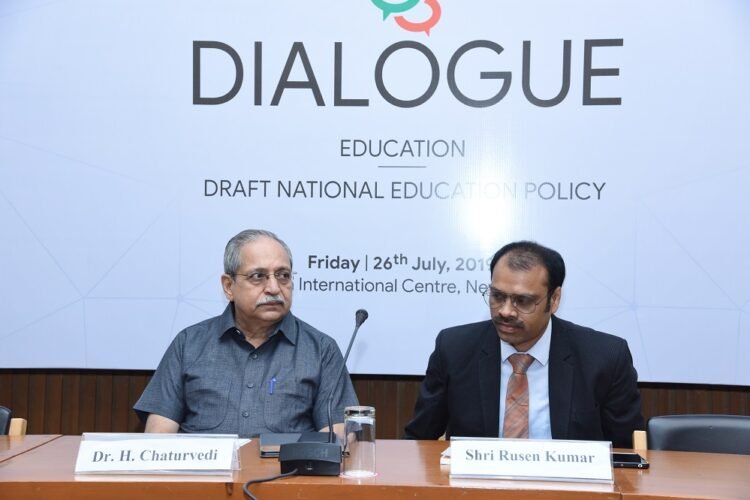New Delhi – India CSR Network, India’s largest digital media in CSR and Sustainability on Friday (26 Jul) organised a dialogue on the Draft National Education Policy (NEP) at the India International Centre in New Delhi.
The ‘India CSR Dialogue’ talked about expectations and opportunities for the corporate sector and the civil society in the Draft NEP. It also talked about the role that the two stakeholders could play to take forward the Sustainable Development Goal (SDG) 4, which envisages to “ensure inclusive and equitable quality education and promote lifelong learning opportunities for all” by 2030.
India CSR will be collating the suggestions and feedback from the participants and will be sending it to the Ministry of Human resource Development (MHRD) before 31 Jul, the last date for sending the feedback.
Dr. Chaturvedi welcomed the Draft policy’s proposal to increase the span of education from existing 6-14 years to 3-18 years. He also praised the proposal to improve infrastructure; closing schools which are financially unviable and shifting the students to neighborhood schools.
He however, said that the implementation part would pose real challenges for the government as an exercise of this nature would require huge resources including increased budget allocations. He said that the existing education budget was hardly 3% of the Gross National product (GNP) even after 52 years since the first policy came which recommended for a 6% allocation.
The CSR expenditure on education initiatives was even less so the primary responsibility rested with the government, he said adding that the private sector’s role was secondary but significant. It should act as an augmenter, he added.
Issues related to rote learning, teachers training, proposal to set-up National Research Foundation, role of anganwadis in early childhood education and curriculum & pedagogy were discussed during the event.

Agarwal said that the introduction of draft NEP could not have come at a better time. The NEP envisages participation of students, teachers, parents and administration at school and government levels roles and TagHive’s technology solution integrated all the stakeholders in its solution to improve the overall learning, teaching and monitoring experience.
Stem Learning’s Pandit too highlighted the importance of innovative pedagogy in school curriculum. The company designs plug-and-play models on Science, Technology, Engineering and Mathematics to enhance understanding and minimise rote learning, he said.
Pandit said that the company installed 700 Mini Science Centers (MSC) in rural schools where table-top models were put. The results and value for our products were far greater in rural centers, he said.
The MHRD constituted a committee in June 2017, under the chairmanship of former ISRO chairman Krishnaswami Kasturirangan to prepare the Draft NEP, 2019. The committee submitted its report on 15 Dec.
The policy was released on 31 May. The government has extended the deadline to submit suggestions from 30 Jun till 31 Jul.
The dialogue was organised in association with STEM Learning and Friends Union for Energising Lives (FUEL).
Mumbai-based Stem Leaning is empowering school teachers with innovative tools to teach science and mathematics. The company has been promoting learning in the field of science, technology, engineering and mathematics at the school level. The company works with corporate groups to develop sustainable and effective CSR (Corporate Social Responsibility) initiatives in education. As of now, the company has tied up with over 100 companies including top banks like the HDFC Bank Ltd, ICICI Ltd and HSBC Ltd to implement its programmes, Pandit said.
Friends Union for Energising Lives (FUEL) stems from the understanding that the youth in India form one of the most vulnerable groups, who on the one hand are expected to be the leaders to determine the destiny of India, and on the other lack essential information and opportunities to succeed in life.







